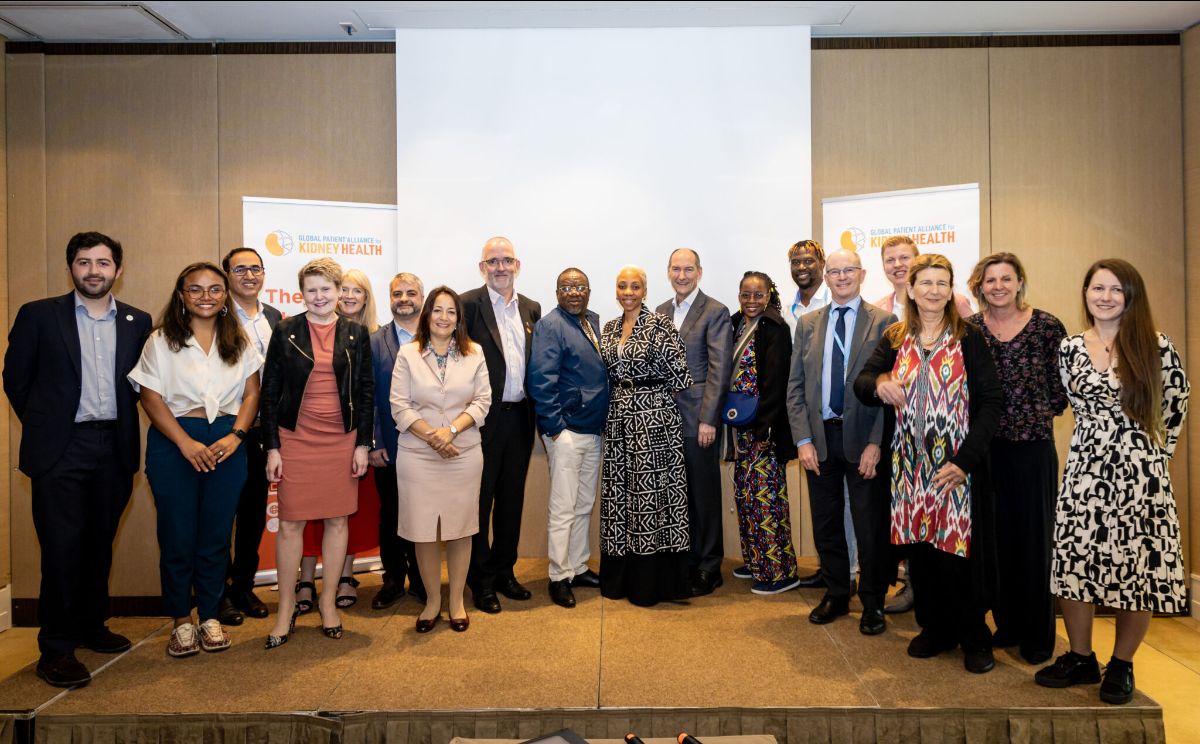In 2024, the Global Patient Alliance for Kidney Health saw an emerging consensus that the rising prevalence of Chronic Kidney Disease (CKD) needs to be addressed. Policymakers are recognizing that with an aging, increasingly at-risk population, immediate action is needed to allow for the early detection, diagnosis and treatment of CKD.
This year, these 5 truths about CKD have become even more apparent and are motivating policymakers to Make the Change for Kidney Health.
Truth #1: Targeted Screenings Save Lives and Lower Costs
A recently released policy brief authored by GloPAKH’s Medical Advisory Council highlighted the burden of CKD and the value of earlier diagnosis and treatment. The brief encouraged policymakers around the world to seize the opportunity to prioritize screenings for CKD—especially for at-risk populations—and outlined specific policy strategies to do so.
The cost savings of prioritizing CKD detection and treatment was highlighted in Politico, where the chair of GloPAKH’s Medical Advisory Council was quoted. “There is a projected 116% rise in mortality from chronic kidney disease between 2019 and 2040,” Dr. Naveep Tangri said. “Those numbers tell the story of a billion-person, trillion-dollar disease.”
In 2024, GloPAKH joined with the International Society of Nephrology and other stakeholders to call on the WHO to formally recognize CKD as a priority noncommunicable disease and include it in global health frameworks. This would provide policymakers worldwide with a roadmap to reduce the burden of CKD.
Truth #2: Policymakers can Make the Change for Kidney Health
In March of 2024, GloPAKH joined with CKD stakeholders from around the world to launch the Make the Change for Kidney Health campaign. The awareness campaign calls on policymakers to recognize CKD as an urgent health priority and implement patient-centered and evidence-based policies to enable earlier detection, diagnosis and immediate access to treatment.
GloPAKH urges advocates everywhere to follow the lead of the Association of Patients with Renal Failure Slovenia and share these videos with their networks, highlighting how Making the Change for Kidney Health benefits patients, caregivers, health systems, societies and the climate.
Truth #3: CKD is Part of a Complex Picture of Related NCDs
In September, at the United Nations General Assembly, GloPAKH joined with other stakeholders urging policymakers to prioritize CKD as they address how integrated approaches to interconnected chronic diseases could result in earlier detection, more effective treatment, better patient outcomes and reduced burdens on health systems, societies, and the environment.
Chronic kidney disease often accompanies other conditions. Diabetes is one of the primary causes of CKD, which affects approximately 850 million people globally. See how early detection can reduce disease impact on patients, families, and healthcare systems worldwide.
Truth #4: A Patient-Centered Approach to Kidney Care Improves Outcomes
Patient-centered care (PCC) offers a pragmatic way of improving patient outcomes. Bill Wang, a patient advocate based in Hong Kong, recently made the compelling case for how a more holistic approach to kidney care in a paper where he outlined the barriers to PCC and the solutions to reaching a more compassionate and comprehensive patient landscape.
The importance of patient centricity in the management of CKD is a goal shared by members of GloPAKH’s Steering Committee. Watch this video and learn why kidney health advocates around the globe are calling on policymakers to prioritize CKD.
Truth #5: Kidney Health Advocates are Mobilizing Worldwide
From World Kidney Day in March to meetings at national capitols and alongside the World Health Organization, GloPAKH is working in every corner of the globe to ease the growing burden of CKD and calling for patients’ timely and comprehensive access to treatment.
This year, at the 77th World Health Assembly in Geneva, GloPAKH convened its first-ever Chronic Kidney Disease Patient Forum. The event program underscored the benefits of screening and early detection and elevating chronic kidney disease as a priority NCD.
In addition, patient advocates sent an open letter to the delegates of the World Health Assembly to encourage the prioritization of CKD as an urgent global public health priority as the World Health Organization prepared to set the agenda for the high-level meeting on NCDs in 2025.
| In 2025, The Global Patient Alliance for Kidney Health looks forward to working with its members and partners to continue to raise awareness about the burden of CKD and the opportunity to improve access to earlier detection and treatment. |

